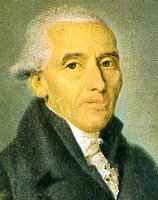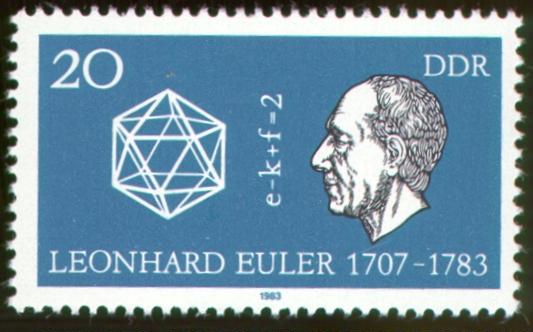1902 Encyclopedia > Algebra > History of Algebra - Joseph Louis Lagrange (1736-1813). Leonhard Euler (1707-83).
Algebra
(Part 13)
(B) HISTORY OF ALGEBRA
(xii) Joseph Louis Lagrange (1736-1813). Leonhard Euler (1707-83).
The first half of the 18th century produced little in the way of addition either to pure algebra or to pure algebra or to its applications. Men were employed rather in elaborating and working out what Newton, Leibnitz, and Descartes had originated, than in exercising themselves in independent investigations.
There are, indeed, to be found some names of eminence associated with the science of algebra, such as Maclaurin, but their eminence will be found to depend on their connection with the extensions of the science, rather than with the science itself.

Joseph Louis Lagrange
It was reserved for Lagrange, in the latter part of the century, to give a new impulse to extension in pure algebra, in a direction which has led to most important results. Not only did he, in his Traité de la Resolution des Equations Numériques, lay the foundation on which Budan, Fourier, Sturm, and others, have built a goodly fabric after the pattern of the Universal Arithmetic of Newton, but in his Théorie des fonctions analytiques, and Calcul des fonctions, he endeavoured, and with a large amount of success, to reduce the higher analysis (the fluxions of Newton), to the domain of pure algebra.

Leonhard Euler depicted on a 1983 stamp from the German Democratic Republic. The stamp also includes a diagram of an icosahedron and Euler's famous polyhedral formula
Nor must the labours of a fellow-workman, Euler, be forgotten. In his voluminous and somewhat ponderous writings will be found a perfect storehouse of investigations on every branch of algebraical and mechanical science. Especially pertinent to our present subject is his demonstration of the Binomial Theorem in the Novi commentarii, vol. xix., which is probably the original of the development that Lagrange makes the basis of his analysis (Calcul des fonctions, leçon seconde), and which for simplicity and generality leaves nothing to be desired.
This brings the history down to the close of the last century. We have been as copious as our limits would permit on the early history, because it presents the interesting spectacle of the progress of a science from an almost imperceptible beginning, until it has attained a magnitude too great to be fully grasped by the human mind.
It will be seen from what precedes, that we have not limited "algebra" to the pure science, but have retained the name when it has encroached on the territories of geometry, trigonometry, and the higher analysis. To continue to trace its course through all these branches during the present century, when it has extended into new directions within its own borders, would far exceed the limits of an introductory sketch like the present. We must, therefore, necessarily limit ourselves to what has been done in the Theory of Equations (which may be termed algebra proper), and in Determinants.
Read the rest of this article:
Algebra - Table of Contents
|